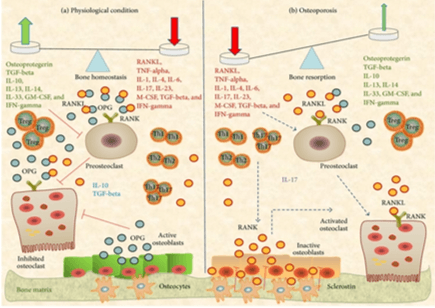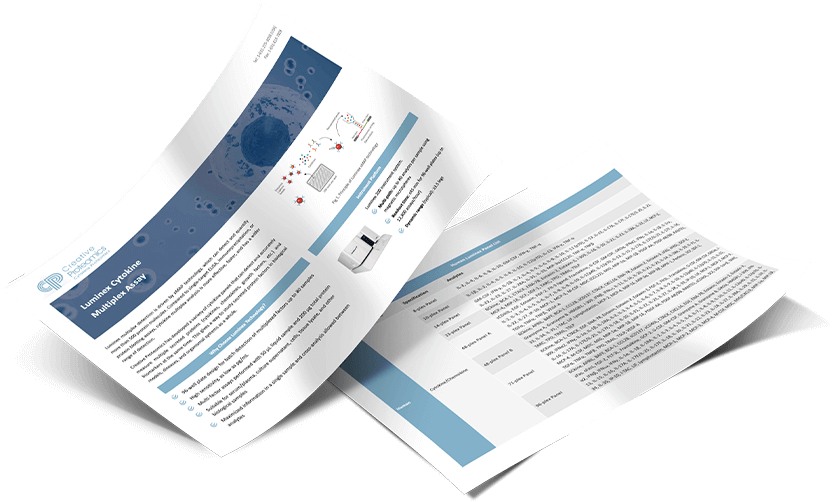Introduction
Creative Proteomics can simultaneously quantitatively detect osteoporosis-related cytokines and chemokines through a variety of technologies, and provide higher sensitivity and a wider detection range.
Osteoporosis (OP) is a type of systemic skeletal disease that often occurs in the elderly. It is characterized by decreased bone mass, destruction of bone tissue microstructure, increased bone fragility, and easy fracture. Bone and muscle tissue are both endocrine organs, and adipose tissue also has the function of regulating endocrine. Related factors secreted by muscles are involved in the regulation of bone growth and development. Bone factors can also affect muscle strength and muscle mass. A variety of adipokines secreted by adipose tissue participate in inflammation and immune response in the body, and maintain the balance of bone metabolism. The decrease in bone density is the result of an imbalance in the musculo-skeletal system. OP is regulated by multiple bones, skeletal muscles and fat tissues during the pathogenesis. Measuring the expression of these cytokines in bone metabolism is helpful for the early diagnosis and prevention of OP.

T Lymphocyte subsets and cytokines in OP
BMPs play a key role in the differentiation of OP osteoblasts. BMPs promote new bone formation by increasing the expression of genes such as alkaline phosphatase and osteocalcin. They can also participate in the growth and development of bone by acting on specific undifferentiated and active mesenchymal cells and inducing their irreversible differentiation into cartilage and bone cells. BMPs also have a positive effect on osteoclasts and can directly or indirectly participate in the synthesis and metabolism of osteoclasts.
TGF-β is produced by bone cells and is expressed at the beginning of fracture healing. It is widely present in normal tissue cells and transformed cells of animals, with the highest content in bone tissue. TGF-β is an important factor coupling bone formation and bone resorption.
FGFs can stimulate the division of mesenchymal cells, bone marrow stromal stem cells, chondrocytes and osteoblasts. FGF2 promotes the synthesis of osteopontin and osteonectin, and plays a positive role in the regulation of osteoclasts in the process of bone formation. FGF-23 is a bone-derived phosphorus-regulating cytokine, most of which are produced and expressed in bone cells.
Myostatin MSTN is a cytokine that inhibits muscle growth and development and is also an important regulator of mesenchymal stem cell proliferation and differentiation. In addition to regulating the growth of skeletal muscle, MSTN can also regulate fat formation and metabolic balance.
Detectable cytokines include but are not limited to:
| BMPs | TGF-β | FGFs | L-1 | IL-6 |
| L-11 |
Technology platform
We mainly provide the Luminex cytokine detection platform. Luminex uses fluorescently encoded microspheres with specific antibodies to different target molecules. The different microspheres can be combined freely to a certain extent so that up to 100 analytes can be tested multiple times simultaneously in a single experiment.
The Luminex cytokine assay platform has the following advantages:
- Multiple detection: simultaneous detection of 100 biological targets
- Short experiment time: 1-3 weeks
- High sensitivity: the lower limit of accurate quantification is as low as 0.1 pg/mL
- Save samples: only need a sample volume as low as 25 μL
- Time saving: the experiment process only takes 4 hours
For your different needs, we can also provide the following detection methods:
- Flow cytometry (FACS analysis): Identify and measure cell biomarkers in complex subpopulations. It can be used for intracellular cytokine detection without two hours.
- Enzyme-linked immunosorbent assay (ELISA): Use the primary antibody for capture, and conjugate the secondary antibody with an enzyme or radioisotope for detection. Our multiplexing system can detect the expression of multiple cytokines at once.
Sample preparation
- Suitable for serum, plasma, cell culture supernatant and all kinds of body fluids.
- The body fluid samples are stored in a refrigerator at -80 degrees Celsius and transported on dry ice.
Creative Proteomics can provide you with a one-stop solution. If you want to test other cytokines or other information you want to consult, please contact us. We are looking forward to cooperating with you.
Reference:
- Pagliari D, Ciro Tamburrelli F, Zirio G, et al. The role of "bone immunological niche" for a new pathogenetic paradigm of osteoporosis. Analytical Cellular Pathology, 2015, 2015.

